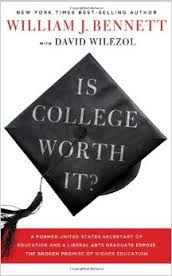In a review of Archibald and Feldman’s Why Does College Cost So Much? (and an associated follow up), I alluded to what has become conventional wisdom regarding the high cost of college, a set of factors almost taken for granted in every other book or film on the topic I’ve reviewed this year.
While so far I’ve seen the conventional wisdom taken as a given (or countered, in the case of Archibald and Feldman), William J. Bennett’s 2013 book Is College Worth It? (written with David Wilezol, the producer of Bennett’s morning radio program) provides a sustained argument regarding why the conventional wisdom is not just true but threatens the future of higher education in the US.
Most readers will likely be familiar with Bennett as one of America’s most well-known conservative commentators whose experience as Secretary of Education during Ronald Reagan’s second term and writings since have made him one of the most long-standing critics of US education policy and the direction of both K-12 and post-secondary schooling.
The book’s main argument regarding the cost of college – “The Bennett Hypothesis” – which states that federal contributions to higher education creates an upward pressure on tuition was first articulated by the author in 1987 in a New York Times op-ed entitled Our Greedy Colleges. Is College Worth It? looks expansively at not just federal need-based tuition assistance programs (like Pell Grants) but at highly underwritten student loans which the authors claim creates huge pools of money that leaves colleges scrambling to not leave a single dollar on the table.
Bennett and Wilezol also take aim at the notion of “college for all” which assumes that anyone who can get a four-year degree (even if it requires taking out huge loans) should do so. For this assumption not only pushes people into college programs that can leave them with lots of IOUs but few job prospects, it also treats alternatives such as two-year degrees, non-degree certification programs, skilled trades or the military as booby prizes for those who can’t cut it in a traditional (and increasingly costly) degree program.
While Bennett’s commentary (which includes the familiar conservative critique of college as being decreasingly demanding and increasingly partisan) can be easily mapped onto the Left-Right template that defines most of our political discourse, you can hear his indictments echoeed even by those who do not share his overarching political views.
The notion that government spending creates a floor to the price of college but not a ceiling is one I’ve heard from people who I suspect are not regular listeners to Bill Bennett’s Morning in America. And the notion of schools ripping off students by taking their money and providing little in return is an increasingly common left-wing critique of higher education (at least with regard to for-profit institutions).
This might be because the Bennett Hypothesis makes a highly intuitive argument that throwing tons of money at a product (like education) is likely to lead more people to sell that product, increase the price of it, or both. And even if one decides to interpret Is College Worth It? ungenerously and claim the authors want those who can’t afford higher ed to learn a trade or go into the military, I believe there is growing acceptance that the notion of “college for all” might be pushing people who should be exploring more options into socially celebrated but economically risky choices.
A friend once described my own politics as a form of “Centrist-Anarchism” which, in the case of education, boils down to having a favorable view of any policies that create a diversity of socially acceptable options for learning, be those liberal-arts-centered four-year residential degrees, professionally centered two-year degrees, robust vocational training programs, religious schooling, the military, entrepreneurship, experimental programs (such as Deep Springs), or – dare I say it – education via MOOC (or other technology-based learning tools).
Speaking of MOOCs, authors of Is College Worth It? seemed enamored of their potential, although the book’s April 2013 publication date means they were writing during the peak of MOOC euphoria, before an equally volatile backlash (coupled with poor results and limited interest in MOOCs on the part of college-age students) helped demonstrated that this high-tech alternative to a traditional college degree was not ready to shake the academy to its foundations anytime soon.
Like their analysis of the reasons behind tuition inflation, Bennett and Wilezol’s interest in MOOCs seemed at variance with the economic arguments presented in Archibald and Feldman’s Why Does College Cost So Much?. Which is why I’d like to dedicate next Monday’s “Price of College” blog entry to an attempt at a reconciliation thesis between these two convincing, even compelling, set of arguments.

Leave a Reply